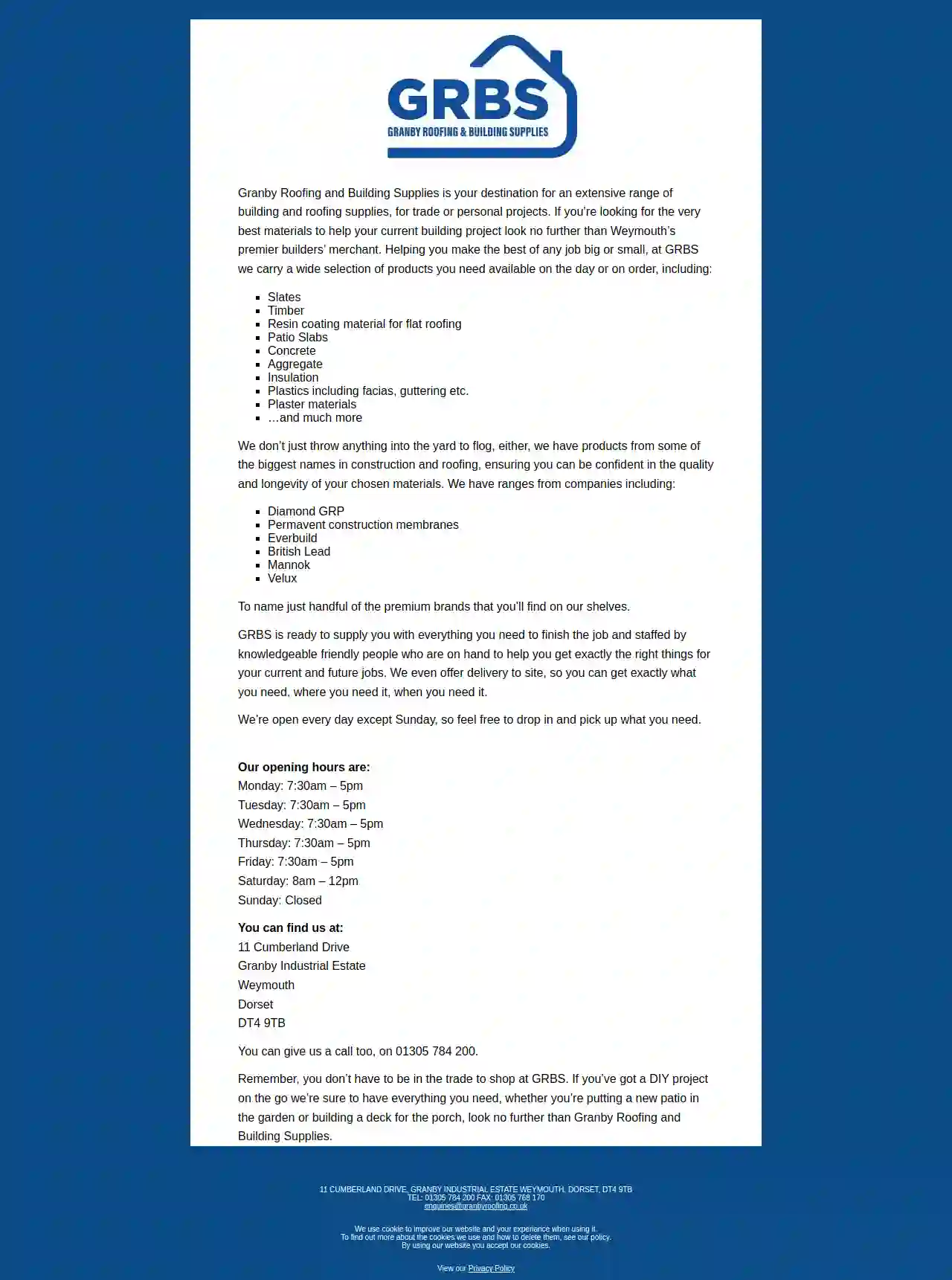Roofing Companies Blandford Forum
Find Roofing Service in Blandford Forum
Receive multiple Roofing Companies quotes for your project today! Compare profiles, reviews, accreditations, portfolio, etc... and choose the best service.

JPS Roofing
52 reviewsSt Albans, 51 Mansfield Avenue, Christchurch, 8014, GBJPS Roofing has been a leading force in the roofing industry for over 30 years, establishing itself as one of New Zealand's top membrane applicators. We've proudly contributed to some of Christchurch's most significant membrane roofing projects, including the 3,000m2 Christchurch International Airport (Hawkins) and the 4,000m2 Farmers Northlands Christchurch (Reroof). Our commitment to excellence has earned us recognition, working alongside Canterbury award winners of the Registered Master Builders House of the Year - Gold (2015) and National Supreme House of the Year (2017). As a Canterbury-owned and operated company, JPS Roofing is dedicated to supporting the New Zealand labour market. We take pride in our exceptional workmanship, letting our results speak for themselves.
- Services
- Why Us?
- Accreditations
- Our Team
- Testimonials
- Gallery
Get Quote
GRBS
4.8100 reviewsGranby Industrial Estate, 11 Cumberland Drive, Weymouth, DT4 9TB, GBGranby Roofing and Building Supplies is your go-to destination for a comprehensive range of building and roofing supplies, catering to both trade professionals and DIY enthusiasts. Located in Weymouth, Dorset, we pride ourselves on being the premier builders' merchant in the area. We're committed to providing you with the best materials for your projects, big or small. Our extensive inventory includes slates, timber, resin coating materials for flat roofing, patio slabs, concrete, aggregate, insulation, plastics (such as fascias and guttering), plaster materials, and much more. We source our products from leading brands in the construction and roofing industry, ensuring quality and durability. You'll find renowned names like Diamond GRP, Permavent construction membranes, Everbuild, British Lead, Mannok, and Velux on our shelves. Our knowledgeable and friendly team is always ready to assist you in finding the perfect materials for your needs. We even offer convenient delivery to your site, ensuring you have everything you need, when you need it. We're open every day except Sunday, so feel free to drop by and browse our selection.
- Services
- Why Us?
- Gallery
Get Quote
CMH Leadwork & Roofing Services Ltd
510 reviews20 Rodden Row, Weymouth, DT3 4JL, GBCMH Leadwork & Roofing Services Ltd is a family-run business based in Weymouth, Dorset, with over 35 years of experience in the roofing trade. Established in 2005, we pride ourselves on the quality of work we complete, as demonstrated by the positive feedback and recommendations from our satisfied customers. Our team of skilled roofers possesses extensive expertise in all aspects of roofing, from minor repairs to complex re-roofs. We cover a wide range of roofing services, including slate roofing, leadwork, GRP flat roofing, Velux windows, uPVC guttering and downpipes, and fascia and soffit work. We are committed to providing our clients with durable, long-lasting solutions that meet their specific needs and exceed their expectations.
- Services
- Why Us?
- Accreditations
- Our Team
- Testimonials
- Gallery
Get Quote
Winter And Son Roofing
4.48 reviewsChristchurch, GBWinter & Son Roofing is an ambitious Christchurch roofing company with a clear vision: to have the best delivery track record in the industry, bar none. While our growing portfolio is our legacy, it is our people who make this vision possible. With experienced minds and fresh thinking, we build proactive partnerships with our clients and deliver outstanding roofing and cladding solutions. Founded in 2016, we are a small family owned and operated roofing company based in Christchurch, New Zealand with massive ambitions. With our people first approach we deliver outcomes founded on our core values of agility, integrity, excellence and pride. These values form the heart of our operation and everything we do comes back to them. When you choose Winter & Son Roofing you will find yourself partnering with people who are knowledgeable, innovative, agile and adaptable. We work with a refreshingly open book approach and direct communication style, to enable the delivery of your project beyond what you thought was possible. We are experienced, we are fresh, we are capable, we are focused. We are determined to deliver.
- Services
- Why Us?
- Gallery
Get Quote
SBL Ltd
4.127 reviewsWeymouth, GB- Services
- Why Us?
- Gallery
Get Quote
NEES Racing
P.O. Box 30, Kaiapoi, 7644, GBWelcome to the online home of NEES Racing and thank you for stopping by. Our aim with the web presence is to supply you an insight into our racing activities and a look at how our speedway careers have evolved. We have included pages for viewing different aspects of the team, some of the cars we have raced (or destroyed) and of course to promote our valued partners. Navigation is via the links on the header and to the left which provide access to various photo galleries and information areas. These include current workshop progress, race results, previous achievements, racing history and some samples of work from Nees Graffix. We hope you enjoy the website and thanks for stopping by ... Roger & Pam Nees.
- Services
- Why Us?
- Accreditations
- Our Team
- Testimonials
- Gallery
Get Quote
Dimond Roofing
4.130 reviewsChristchurch, GBCommitted to preserving Aotearoa's alpine parrot. We're excited to announce our partnership with the Kea heroes of the South Island, the Kea Conservation Trust (KCT). For over 50 years Dimond Roofing has been a leading supplier to the New Zealand construction industry. We offer the leading range of long run roofing, cladding, architectural tray, and solar roofing products across New Zealand. These products are used by homeowners, commercial building owners, builders and farmers across the country.
- Services
- Why Us?
- Gallery
Get Quote
The Roof and Brick Shoppe
4.48 reviewsChristchurch, 538 Marshland Rd, 8083, GBWelcome to The Roof and Brick Shoppe, a family run business established over nine years ago by Mark Hughes who has over 30 years roofing experience. Your roof and brick choice is a crucial decision, they are the first thing people see when approaching your home so it’s imperative to get it spot on. Our experienced roofing team prides themselves on their great customer service, professionalism and excellent workmanship using only the best products. Our team are all site safe and Fletchers accredited. We have played a huge part in working in the Christchurch rebuild repairing well over 1000 residential properties, installing numerous new roofs in and around Christchurch as well as supplying bricks for the recladding and the new builds. We have a good reputation and have major building companies coming to us to do their repairs. Come down and see us at 538 Marshland Road. Our helpful, knowledgeable and friendly staff are here to show you around our outdoor brick display and to match window frames and roof colours to get the design and colours you are looking for.
- Services
- Why Us?
- Accreditations
- Our Team
- Gallery
Get Quote
Hookers Roofing
GBWelcome to Hookers Roofing, your trusted roofing company in Christchurch Canterbury. With years of experience in the industry, we specialize in residential and commercial metal iron roofing. Whether you need a new roof installation, re-roofing services, or repairs, we've got you covered. Our skilled team is equipped to handle projects of any size, ensuring quality workmanship and attention to detail. At Hookers Roofing, we take pride in delivering reliable and efficient services to our valued customers. Contact us today for all your roofing needs.
- Services
- Why Us?
- Our Team
Get Quote
Graham Hill Roofing Limited & Kiwifold NZ Limited
4.47 reviewsWaterloo Business Park, 7 Doric Way, Islington, Christchurch, 8042, GBGraham Hill Roofing Ltd is one of New Zealand’s largest suppliers and installers of metal roofing in the commercial market. We are a growing, locally owned company that has been operating for over 40 years and we have built a reputation for carrying out quality, well managed roofing projects. Our management team has many years experience in the commercial roofing industry. They can advise on material usage and budgeting for major projects, and will ensure all projects are professionally supervised and completed to the very highest of standards. Graham Hill Roofing Ltd is a long standing member of the Roofing Association. We are committed to health and safety in the workplace and we have a strong focus on continued workplace staff training. All our staff have Site Safe and Working at Heights passports.
- Services
- Why Us?
- Testimonials
- Gallery
Get Quote
Over 12,314+ Roofers on our directory
Our roofing experts operate in Blandford Forum & surrounding areas!
Roofyng.co.uk has curated and vetted the Best Roofers in and around Blandford Forum. Find a reliable contractor today.
Frequently Asked Questions About Roofing Companies
- Age: If your roof is nearing or exceeding its expected lifespan, it's wise to consider replacement.
- Multiple Leaks: Several leaks or leaks that reappear after repairs suggest a widespread problem.
- Extensive Damage: Large areas of damaged, missing, or deteriorated roofing materials might be too costly or difficult to repair effectively.
- Sagging or Structural Issues: Sagging, deflection, or other structural issues indicate a compromised roof that needs replacement.
- Granule Loss (Asphalt Shingles): Significant granule loss indicates weathering and reduced protection.
- Curling or Buckling Shingles: Signifies age or improper ventilation.
- Increased Energy Bills: A poorly insulated roof can lead to higher heating and cooling costs.
- Choose Reflective Roofing Materials: Opt for light-colored shingles or metal roofing that reflects sunlight and reduces heat absorption.
- Install Proper Attic Insulation: Adequate insulation prevents heat loss in the winter and heat gain in the summer.
- Ensure Adequate Ventilation: Proper attic ventilation allows hot air to escape, reducing cooling costs and extending the lifespan of your roof.
- Consider a Radiant Barrier: In hot climates, a radiant barrier installed in the attic can reflect heat away from the roof, further reducing cooling needs.
- Safety First: Avoid going onto the roof during a storm, as it's dangerous.
- Document the Damage: Take photos and videos of the damage for insurance purposes.
- Contact Your Insurance Company: Report the damage to your insurance company as soon as possible to initiate a claim.
- Temporary Repairs: If safe, address any immediate leaks using buckets or tarps to minimize further damage.
- Contact a Roofing Contractor: After the storm, have a qualified roofing contractor inspect the roof and provide a repair estimate.
- Experience: 'How long have you been in business, and what experience do you have with my type of roof?'
- Licensing and insurance: 'Are you licensed and insured, and can I see proof of coverage?'
- Warranties: 'What warranties do you offer on your work and the materials used?'
- References: 'Can you provide references from past clients?'
- Project Timeline: 'What is the estimated timeline for completing the project?'
- Payment Terms: 'What are your payment terms, and do you require a deposit?'
- Communication: 'How will you keep me updated on the project's progress?'
- Cleanup: 'What steps will you take to protect my property during the project and ensure proper cleanup afterward?'
What are the signs that my roof needs to be replaced?
How can I make my new roof more energy-efficient?
What should I do if my roof is damaged in a storm?
What questions should I ask a roofing contractor?
What are the signs that my roof needs to be replaced?
- Age: If your roof is nearing or exceeding its expected lifespan, it's wise to consider replacement.
- Multiple Leaks: Several leaks or leaks that reappear after repairs suggest a widespread problem.
- Extensive Damage: Large areas of damaged, missing, or deteriorated roofing materials might be too costly or difficult to repair effectively.
- Sagging or Structural Issues: Sagging, deflection, or other structural issues indicate a compromised roof that needs replacement.
- Granule Loss (Asphalt Shingles): Significant granule loss indicates weathering and reduced protection.
- Curling or Buckling Shingles: Signifies age or improper ventilation.
- Increased Energy Bills: A poorly insulated roof can lead to higher heating and cooling costs.
How can I make my new roof more energy-efficient?
- Choose Reflective Roofing Materials: Opt for light-colored shingles or metal roofing that reflects sunlight and reduces heat absorption.
- Install Proper Attic Insulation: Adequate insulation prevents heat loss in the winter and heat gain in the summer.
- Ensure Adequate Ventilation: Proper attic ventilation allows hot air to escape, reducing cooling costs and extending the lifespan of your roof.
- Consider a Radiant Barrier: In hot climates, a radiant barrier installed in the attic can reflect heat away from the roof, further reducing cooling needs.
What should I do if my roof is damaged in a storm?
- Safety First: Avoid going onto the roof during a storm, as it's dangerous.
- Document the Damage: Take photos and videos of the damage for insurance purposes.
- Contact Your Insurance Company: Report the damage to your insurance company as soon as possible to initiate a claim.
- Temporary Repairs: If safe, address any immediate leaks using buckets or tarps to minimize further damage.
- Contact a Roofing Contractor: After the storm, have a qualified roofing contractor inspect the roof and provide a repair estimate.
What questions should I ask a roofing contractor?
- Experience: 'How long have you been in business, and what experience do you have with my type of roof?'
- Licensing and insurance: 'Are you licensed and insured, and can I see proof of coverage?'
- Warranties: 'What warranties do you offer on your work and the materials used?'
- References: 'Can you provide references from past clients?'
- Project Timeline: 'What is the estimated timeline for completing the project?'
- Payment Terms: 'What are your payment terms, and do you require a deposit?'
- Communication: 'How will you keep me updated on the project's progress?'
- Cleanup: 'What steps will you take to protect my property during the project and ensure proper cleanup afterward?'